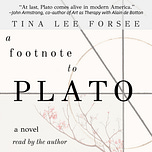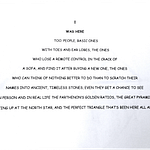You made it to the finish line! Thanks for reading A Footnote to Plato!
Don’t forget to check out the book club questions at the bottom of this post as well as the short videos below.
I posted this novel here on Substack as a free podcast because, as many of you know, fiction is a tough sell these days. After spending a decade writing this novel and doing the usual peddling writers must do these days (not very well), I have yet to break even on it. That’s what’s to be expected, I suppose. You can read more about my publishing story here. So if you enjoyed this book, you can show it by:
Buying me a coffee or a glazed donut from my favorite Mexican bakery (they’re only $1…what in the world is only $1 these days?) or whatever you can afford (see buttons below).
Gifting a subscription to yourself or a friend ($20 for a full year!)
Telling your friends about it. Send them a link to episode one to start them off.
Hitting the “restack” button to share my work with your Substack audience.
Writing a review on Amazon or Goodreads or your blog or wherever you like. Doesn’t have to be long or elaborate or clever or well-written. Really! A few words, five minutes of your time is all!
A special thanks to my paying subscribers for making this seem less like an expensive and time-consuming hobby!
Thank you everyone for coming along for the ride!
Tina
Bonus video: Zeb’s Poem in Motion
Previously on “A Footnote to Plato”…
“You did everything you could to drag out this investigation. All I’m asking is, was it worth it? Are you satisfied?”
In Chapters 20, 21, & 22…
Both Zeb and Dr. Fischelson return home to face the problems they left behind and are forced to make life-changing decisions.
Zeb is broke, as usual, but resists the pleas (and the temptation) to get back into dealing coke. He can’t afford a memorial service, but he’s intent on honoring his grandmother’s memory by keeping her ashes inside a treasured tchotchke and carrying it with him wherever he goes.
Dr. Fischelson acknowledges he’s made mistakes, but he also knows he now has the upper hand in the investigation. He could make trouble for the college if he wanted to, but he would rather just be done with it. He announces his retirement. Rory, the college president, is pleasantly surprised and eager to show his appreciation.
Set up your podcast app to start downloading.
Zeb’s Divided line diagram:
Hand-drawn diagrams and mathematical demonstration by Chris Sonnack. A full explanation can be found on his blog: logosconcarne.com. (More on the making of these diagrams in “Footnotes”!)
Discussion Questions for A Footnote to Plato
You might be familiar with the famous quote by the philosopher, Alfred North Whitehead, who once said,
“The safest general characterization of the European philosophical tradition is that it consists of a series of footnotes to Plato.”
Why does Dr. Fischelson aspire to be a footnote to Plato? What does that say about his character? Do you find that a worthy aspiration? Do you find it strange that this quote wasn’t the epigraph? What do you make of the actual epigraph (below), and why do you think it was used instead?
Having yet to choose his next life was the soul of Odysseus, and his lot happened to be the last of them all. Recollection of former toils had disenchanted him of ambition, and he went about for a long time in search of the life of an ordinary citizen who minded his own business. With difficulty he found it lying in some corner disregarded by the others. —The Myth of Er in Plato’s Republic, Book X, 620.
In several places in the novel, Dr. Fischelson compares himself to Socrates, who in turn compares himself to Achilles. For instance, in Ch. 3:
“By referencing this moment in the Iliad, Socrates not only brazenly compares himself to an epic war hero, but also hints at his true reason for wanting to stay in prison: better to die a martyr than to live out his old age in obscurity. That decision secured his legacy for over two thousand years. A fertile afterlife indeed.”
Why does Dr. Fischelson change his mind at the end and decide he’s really more like Odysseus? Do you agree with his self-assessments? Who do you find most admirable: Achilles or Odysseus?
What is the purpose of the divided line diagram in the story? Can you find any correlations to it in the book’s plot, characters, themes, structure…? Can you find correlations to it in real life?
In Chapter 3, Zeb says:
“Maybe the point isn’t that the examined life is sufficient for happiness, but that it’s necessary. I mean, we take it for granted that being filthy rich is a good thing, but then you hear about rock stars who blow millions on drugs and end up destitute. Same goes for power and fame, they can corrupt you and make you miserable unless you know how to handle them. So ‘conversing about virtue’ could mean trying to figure out the best way to handle both good and bad fortune, whatever comes our way. I think that’s something we’d all be interested in.”
Do you agree with Zeb’s interpretation of the examined life? Do you think the unexamined life is not worth living? Why or why not?
What does the Wall of Fame represent? Does it mean something different to the protestors? To Dr. Fischelson? To Zeb?













Share this post